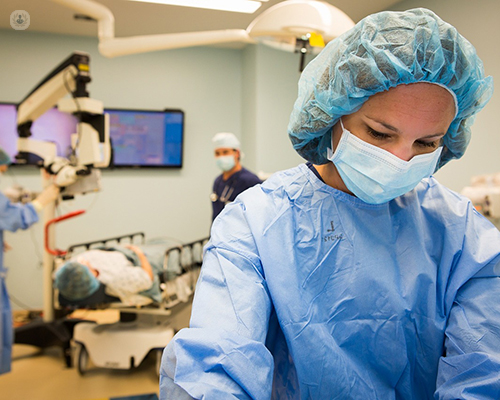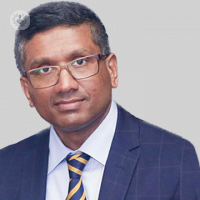Gallstones and their treatment: your questions answered
Written by:In his latest article, renowned consultant general surgeon Mr Vijitha Chandima Halahakoon offers his expert insight into gallstones. He explains how common they are, what the risk factors and how they are treated among many other interesting points.

How common are gallstones and do they always need an operation?
Gallstones are found in about 10 – 15% of the population. However, only a minority will have symptoms. One needs operation or interventions only if they are symptomatic. Incidentally detected gallstones can be left unattended as they are unlikely to cause symptoms or complicate in the time to come.
What are the risk factors associated with developing gallstones?
Gallstones are thought to be caused by an imbalance in the chemical makeup of bile inside the gallbladder.
Most of the time there are no precipitating causes, however, there are some recognised risk factors that make someone at risk of having gallstones. Some of these risk factors are;
- Having a higher BMI
- Being a woman (particularly if you have had children)
- Being 40 years of age or over (the risk increases as you get older)
- Losing weight
- Certain blood conditions like haemolytic conditions.
What are the typical symptoms and clinical presentations of patients with gallstones?
Typical gallstone pain is usually on the right upper quadrant of the abdomen or in the upper centre of the abdomen. This mainly occurs after a heavy, fatty meal and can come in waves. The pain can radiate to the right upper back. This can be associated with nausea and vomiting. The typical pain is felt more during the night and comes back again and again in recurrent attacks.
What are the complications of gallstone disease?
The commonest complication is the inflammation of the gall bladder called cholecystitis (more intense pain and tenderness under the right rib cage).
If a stone in the gall bladder escapes into the bile ducts and blocks one of them, then it can cause jaundice (yellow discolouration of eyes and skin). If this leads to infected bile, we call it cholangitis (high fever with chills and rigours and yellow discolouration of eyes and skin). Sometimes one of these stones can block the pancreatic duct and cause it to inflame (pancreatitis).
Very rarely a stone passing through the bowel can cause a blockage of the bowel – gallstone ileus (crampy abdominal pain, distention, vomiting and constipation).
How do you diagnose gallstones?
The investigation of choice for gallstones is ultrasonography. However, if there are concerns about a stone in the bile ducts, then a special MRI scan called MRCP is helpful. Inflammatory markers like full blood count, C reactive protein (CRP) and liver function are also performed to complete the picture.

Is an operation always indicated if someone has gallstones?
If one has had symptoms of gallstones or a complication, then an operation to deal with the gall bladder is recommended to avoid further complications – some complications, like pancreatitis and cholangitis, can be serious.
Describe how a gallbladder operation is carried out.
Gall bladder removal is performed as a day case operation (where you go home on the same day) under general anaesthesia (as such you need to be accompanied home by an adult). This is performed as a keyhole (laparoscopic) operation. There will be four incisions about 1 cm in size.
What are the restrictions after a gallbladder operation?
Following the operation, it is advisable to avoid driving for about a week and avoid lifting anything heavy for about 4 weeks (to prevent incisional hernia). You may want to stay off work for about 2 weeks too. There are no special dietary restrictions after the operation.
What are the possible complications after gallbladder operations?
Laparoscopic cholecystectomy is a very safe operation. However, as with any other operation, there are some recognised complications following laparoscopic cholecystectomy.
The incidence of injury to bile ducts and bowel is very rare (around 0.5%). However, if this occurs, they are significant complications, needing further procedures. The other complications include infection, bleeding, bile leak and collection.
Are non-surgical approaches such as medications, options?
Although historically there had been attempts at dealing with gallstones without operations, these options are not as effective as an operation.
There are two options - gallstone dissolving medications and lithotripsy (stone-crushing techniques). These are only for cholesterol stones. Both these options don’t work as well compared to an operation and as such most surgeons would not recommend it.
Oral dissolution therapy involves using medicines that contain bile acids that can break up gallstones. You may need months or years of treatment to break up all stones. However, when you stop taking these, stones reform. Shock wave lithotripsy uses shock waves to blast gallstones into small pieces.
Mr Vijitha Chandima Halahakoon is a renowned consultant general surgeon based in Essex. If you would like to book a consultation with Mr Halahakoon you can do so today via his Top Doctors profile.


